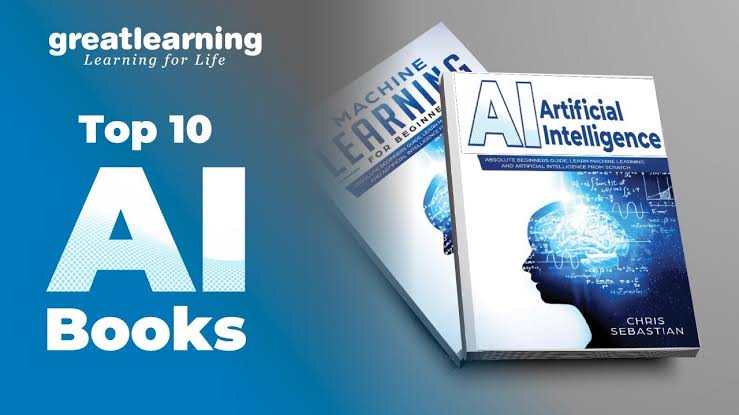Artificial Intelligence (AI) is one of most transformative technologies of our time influencing myriad fields from healthcare to finance and even everyday life. For beginners keen to explore this fascinating domain, finding right resources is crucial. Books provide a structured and comprehensive way to delve into AI. Offering insights into its theoretical underpinnings practical applications and ethical considerations. This article highlights the top 10 AI books that are ideal for beginners. Guiding them on a journey from fundamental concepts to advanced understanding.
1. Artificial Intelligence: A Guide for Thinking Humans by Melanie Mitchell
Melanie Mitchell's "Artificial Intelligence: A Guide for Thinking Humans" is an excellent starting point for anyone new to AI. This book demystifies complex AI concepts and makes them accessible to broad audience. Mitchell, a computer scientist combines historical context with contemporary developments. Providing a well-rounded view of AI. She explores how AI systems work, the challenges they face and potential future implications all while maintaining a conversational and engaging tone.
2. Artificial Intelligence: New Synthesis by Nils J. Nilsson
Nils J. Nilsson's "Artificial Intelligence: New Synthesis" is another foundational text for beginners. Nilsson pioneer in AI research, offers comprehensive overview of AI's core principles and methodologies. The book covers wide range of topics. Examples include machine learning. And also neural networks and robotics. Its clear explanations and practical examples make it invaluable resource for those looking to build solid understanding of AI.
3. Deep Learning by Ian Goodfellow, Yoshua Bengio, and Aaron Courville
For beginners interested in the subset of AI known as deep learning, "Deep Learning" by Ian Goodfellow, Yoshua Bengio, and Aaron Courville is a must-read. This book is often regarded as the definitive guide to deep learning, providing in-depth coverage of neural networks, algorithms, and practical applications. While it is more technical than some of the other books on this list, its thorough approach makes it an essential resource for those serious about mastering deep learning.
4. Artificial Intelligence: Foundations of Computational Agents by David L. Poole and Alan K. Mackworth
"Artificial Intelligence: Foundations of Computational Agents" by David L. Poole and Alan K. Mackworth is a comprehensive introduction to AI that balances theory and practice. The authors cover a broad spectrum of AI topics, from search algorithms to knowledge representation and reasoning. The book's structured approach, combined with its numerous examples and exercises, makes it an ideal choice for beginners seeking a deep and systematic understanding of AI.
5. Superintelligence: Paths, Dangers, Strategies by Nick Bostrom
Nick Bostrom's "Superintelligence: Paths, Dangers, Strategies" explores the future implications of AI and the potential emergence of superintelligent machines. While not a technical manual, this book is essential for beginners who want to understand the broader ethical and philosophical questions surrounding AI. Bostrom examines scenarios in which AI surpasses human intelligence and discusses strategies to ensure beneficial outcomes, making it a thought-provoking read for anyone interested in the long-term impact of AI.
6. Machine Learning for Absolute Beginners by Oliver Theobald
For those starting from scratch, "Machine Learning for Absolute Beginners" by Oliver Theobald is a practical and straightforward introduction to machine learning, a critical component of AI. Theobald breaks down complex concepts into easily digestible explanations, complete with illustrations and real-world examples. This book is particularly useful for readers with no prior programming experience, as it provides a gentle and approachable introduction to the subject.
7. Python Machine Learning by Sebastian Raschka and Vahid Mirjalili
"Python Machine Learning" by Sebastian Raschka and Vahid Mirjalili is an excellent resource for beginners looking to get hands-on experience with AI and machine learning using Python. The book covers fundamental machine learning algorithms, data preprocessing techniques, and model evaluation. Its practical approach, combined with code examples and exercises, allows readers to apply what they learn and build their own AI projects. This book is ideal for those who prefer learning by doing and want to gain practical skills in AI development.
8. Artificial Intelligence: A Very Short Introduction by Margaret A. Boden
Margaret A. Boden's "Artificial Intelligence: A Very Short Introduction" offers a concise and accessible overview of AI. Part of the "Very Short Introduction" series, this book distills complex AI topics into a compact and readable format. Boden, a renowned AI researcher, covers the history, current state, and future prospects of AI, making it a great starting point for beginners seeking a quick yet comprehensive introduction to the field.
9. Life 3.0: Being Human in the Age of Artificial Intelligence by Max Tegmark
Max Tegmark's "Life 3.0: Being Human in the Age of Artificial Intelligence" explores the transformative potential of AI and its implications for humanity. Tegmark, a physicist and AI researcher, discusses the possibilities and risks associated with advanced AI, from job displacement to ethical considerations. This book is particularly valuable for beginners interested in the societal and philosophical dimensions of AI. Tegmark's engaging writing style and thought-provoking ideas make it a compelling read.
10. Hands-On Machine Learning with Scikit-Learn, Keras, and TensorFlow by Aurélien Géron
For beginners eager to dive into practical AI development, "Hands-On Machine Learning with Scikit-Learn, Keras, and TensorFlow" by Aurélien Géron is an excellent choice. This book provides a comprehensive guide to building machine learning models using popular Python libraries. Géron covers a wide range of topics, from data preprocessing to deep learning techniques, with numerous code examples and exercises. This hands-on approach allows readers to gain practical experience and develop their own AI applications.
Conclusion
Exploring the world of artificial intelligence can be both exciting and daunting for beginners. The right books can provide a solid foundation, guiding readers through the complexities of AI and helping them develop a deep understanding of its principles and applications. The ten books highlighted in this article offer a range of perspectives, from technical manuals to thought-provoking explorations of AI's future. Whether you are interested in machine learning, ethical considerations, or practical development, these books will equip you with the knowledge and skills to navigate the ever-evolving field of artificial intelligence.
